2011 UEFA European Under-21 Championship
The 2011 UEFA European Under-21 Championship was the 18th staging of UEFA's European Under-21 Championship. The final tournament was hosted by Denmark between 11 and 25 June 2011.
| UEFA U21-EM 2011 (in Danish) | |
|---|---|
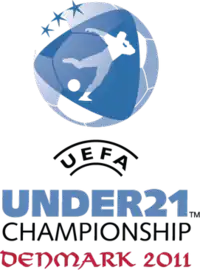 | |
| Tournament details | |
| Host country | |
| Dates | 11–25 June |
| Teams | 8 (finals) 52 (qualifying) (from 1 confederation) |
| Venue(s) | 4 (in 4 host cities) |
| Final positions | |
| Champions | |
| Runners-up | |
| Third place | |
| Fourth place | |
| Tournament statistics | |
| Matches played | 16 |
| Goals scored | 36 (2.25 per match) |
| Attendance | 101,955 (6,372 per match) |
| Top scorer(s) | |
| Best player(s) | |
The Danish bid was chosen by UEFA's Executive Committee on 10 December 2008 in Nyon, Switzerland.[1] This bid defeated the other bid from Israel.
Qualification for the final tournament took place between March 2009 and October 2010.
This competition also acted as a qualifier for the 2012 Summer Olympics, as 3 teams qualified.
Spain won their third title after defeating Switzerland 2–0 in the final.[2][3]
Host selection
.jpg.webp)
The organisation of the event was initially contested by only two bids: Denmark and Israel. The bids were submitted on 15 June 2008.[4]
The bids were inspected between June and September 2008, and a report was given to the National Team Competition Committee in October. The committee discussed the bids on 27 November 2008 and issued a recommendation to the UEFA Executive Committee, who decided on 10 December 2008 that Denmark would host the finals.[1][4]
Qualification
The draw for the 2011 UEFA European Under-21 Championship qualifying round took place in Århus on 4 February 2009. The qualifying draw determined the makeup of ten groups. Ten groups were formed in the qualifying draw including two sections of six sides and eight of five, as teams chase 7 finals places alongside host Denmark. The seeding pots are formed on the basis of former performance in the tournament. All groups contained one nation from the first five pots and two sections also included a team from Pot 6. The six European federations that have qualified for the 2009 FIFA U-20 World Cup (Germany, Italy, Czech Republic, Hungary, Spain and England) were each drawn in one of the six groups of five teams.
2012 Summer Olympics and Great Britain team
The tournament was used as the European qualifying tournament for the 2012 Summer Olympics in London with the top teams qualifying for London 2012. The four British federations entered the qualification process as single entities, but are not eligible to qualify for the Olympics. If one or more British teams had qualified for the Championship, and to pass the first round, play-off games would be played (like in 2007 when Italy and Portugal faced for the last place in the Olympics). As Great Britain is the host nation for the 2012 Olympics, it is entitled to an automatic place in the competition. This caused controversy as in the Olympics, Great Britain competes as a single unified country, as opposed to the four individual nations in football. Scotland, Wales and Northern Ireland all logged public objections to the idea of a GB team at the Olympics, fearing that it would jeopardise their independent status in UEFA and FIFA. A compromise was reached in 2009 whereby England would field a team for the tournament, while the other three would not participate, but not object to England's involvement.[5]
List of qualified teams
The following 8 teams qualified for the 2011 UEFA European Under-21 Championship
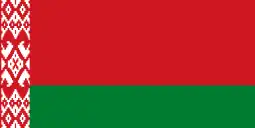 Belarus
Belarus Czech Republic
Czech Republic Denmark (Host Nation)
Denmark (Host Nation) England
England Iceland
Iceland Spain
Spain.svg.png.webp) Switzerland
Switzerland Ukraine
Ukraine
Venues
The tournament venues were all located in Jutland, at already existing stadiums in Aarhus, Aalborg, Herning and Viborg.
On 20 September 2010 it was announced that Aarhus Stadion would host the final. Further Aalborg Stadion was confirmed as the venue for the opening match and the eventual Olympic qualifying play-off. The semifinals were played at Herning Stadium and Viborg Stadion.[6] It was also published that Denmark would play all of its matches in Aalborg and Aarhus.[7]
| Aarhus | Aalborg | Herning | Viborg |
|---|---|---|---|
| Aarhus Stadion | Aalborg Stadion | Herning Stadium | Viborg Stadion |
| 56°7′55″N 10°11′47″E | 57°3′5.4″N 9°53′56.76″E | 56°7′1″N 8°57′6″E | 56°27′21.23″N 9°24′7.43″E |
| Capacity: 20,000 | Capacity: 10,500 | Capacity: 9,600 | Capacity: 9,566 |
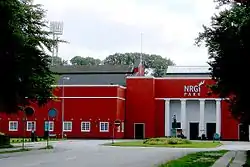 |
 |
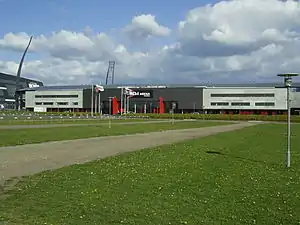 |
.jpg.webp) |
Format
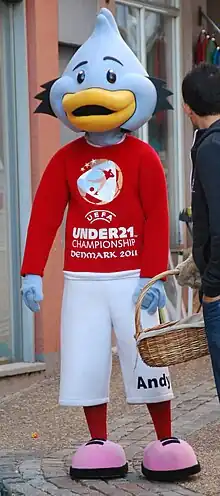
The final tournament consisted of two groups of four, with the top two from each progressing to the semifinals where it becomes a knockout competition. In the finals held a year before a summer Olympic Games the championship also serves as qualification for the Olympic Football Tournament.
Players were eligible for the 2011 UEFA European Under-21 Championship if they were born on or later than 1 January 1988.[8]
Seeding
The draw for the final tournament took place on 9 November 2010 at Aalborg Congress & Culture Centre in Aalborg.[9]
Similar to former tournaments, the games in each group are to be held at just two stadia. For the draw, the finalists were divided into three seeding pots, based on average points per game in the qualifying phase, with each group having one team from pot 1 and 2, and two teams from pot 3. Denmark, as hosts, were seeded first automatically.[10]
| Pot 1 | Pot 2 | Pot 3 |
|---|---|---|
|
Squads
Squads for the 2011 Euro U-21 Championship consisted of 23 players, as in the previous tournament in 2009. Only players born on or after 1 January 1988 were eligible to play.
Referees
In April 2011 UEFA published a list of referees, assistant referees and fourth officials to officiate at the tournament. All of the referees are either Premier Category 1-referees or Category 2-referees, respectively the second highest and third highest tier of international referees. All referees are appointed because they are deemed to be future elite referees, thus they are all between 31 and 38 years old and therefore adhere to the U21 philosophy of being the tournament of the stars of tomorrow.[11]
Referees
- Robert Schörgenhofer (Austria)
- Paolo Tagliavento (Italy)
- Marijo Strahonja (Croatia)
- Aleksandar Stavrev (Macedonia)
- Milorad Mažić (Serbia)
- Markus Strömbergsson (Sweden)
Fourth officials
Tiebreakers
As in Under-21 Euro 2009: If two or more teams are equal on points on completion of the group matches, the following criteria are applied to determine the rankings.
- Higher number of points obtained in the group matches played among the teams in question
- Superior goal difference from the group matches played among the teams in question
- Higher number of goals scored in the group matches played among the teams in question
- If, after applying criteria 1 to 4 to several teams, two or more teams still have an equal ranking, the criteria 1 to 4 will be reapplied to determine the ranking of these teams. If this procedure does not lead to a decision, criteria 5 and 6 will apply
- Results of all group matches:
- Superior goal difference
- Higher number of goals scored
- Fair play conduct
- Drawing of lots
Group stage
The draw took place on 9 November 2010 in Aalborg, Denmark.[12] The first round saw the eight teams divided into two groups of four teams. Each group was a round-robin, where each teams plays one game against every other team in their group. Teams were awarded three points for a win, one point for a draw and no points for a defeat. The teams finishing first and second in each group qualified for the semifinals.
Group A
In group A tie-breakers were needed to break down the three-point tie with Belarus, Denmark and Iceland. Belarus advanced due to a better goal difference in the matches between those three.[13]
|
3 Way Tie-Breaker
|
All times are UTC+2.
| Denmark | 0–1 | |
|---|---|---|
| Report | Shaqiri |
| Switzerland | 2–0 | |
|---|---|---|
| Frei Emeghara |
Report |
| Iceland | 3–1 | |
|---|---|---|
| Sigþórsson Bjarnason Valgarðsson |
Report | Kadrii |
Group B
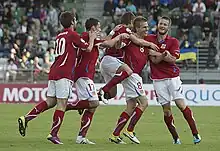
| Team | Pld | W | D | L | GF | GA | GD | Pts |
|---|---|---|---|---|---|---|---|---|
| 3 | 2 | 1 | 0 | 6 | 1 | +5 | 7 | |
| 3 | 2 | 0 | 1 | 4 | 4 | 0 | 6 | |
| 3 | 0 | 2 | 1 | 2 | 3 | −1 | 2 | |
| 3 | 0 | 1 | 2 | 1 | 5 | −4 | 1 |
All times are UTC+2.
| Czech Republic | 2–1 | |
|---|---|---|
| Dočkal |
Report | Bilyi |
| Czech Republic | 0–2 | |
|---|---|---|
| Report | Adrián |
Knockout stage
Knockout map
| Semi-finals | Final | |||||
| 22 June – Herning | ||||||
| 1 | ||||||
| 25 June – Aarhus | ||||||
| 0 | ||||||
| 0 | ||||||
| 22 June – Viborg | ||||||
| 2 | ||||||
| 3 | ||||||
| 1 | ||||||
| Olympic play-off | ||||||
| 25 June – Aalborg | ||||||
| 0 | ||||||
| 1 | ||||||
Semifinals
Winners qualify for 2012 Summer Olympics.
| Switzerland | 1–0 (a.e.t.) | |
|---|---|---|
| Mehmedi |
Report |
Olympic play-off
Winner qualifies for 2012 Summer Olympics.
| Czech Republic | 0–1 | |
|---|---|---|
| Report | Filipenko |
Final
| Switzerland | 0–2 | |
|---|---|---|
| Report | Herrera Thiago |
Goalscorers
- 5 goals
- 3 goals
- 2 goals
- 1 goal
Team of the Tournament
The UEFA Technical Team was charged with naming a squad composed of the 23 best players over the course of the tournament. The group of nine analysts watched every game at the tournament before making their decision after the final. Spain, with seven, had most players in the team.[14]
- UEFA Team of the Tournament
Medal table and Olympic qualifiers
- Spain, Switzerland and Belarus qualify for the Olympic games finals.
See Football at the 2012 Summer Olympics
| Pos | Team | Pld | W | D | L | GF | GA | GD | Pts | Final result |
|---|---|---|---|---|---|---|---|---|---|---|
| 5 | 4 | 1 | 0 | 11 | 2 | +9 | 13 | Gold Medal | ||
| 5 | 4 | 0 | 1 | 7 | 2 | +5 | 12 | Silver Medal | ||
| 5 | 2 | 0 | 3 | 5 | 8 | −3 | 6 | Bronze Medal | ||
| 4 | 5 | 2 | 0 | 3 | 4 | 6 | −2 | 6 | Fourth place | |
| 5 | 3 | 1 | 0 | 2 | 3 | 5 | −2 | 3 | Eliminated in group stage | |
| 6 | 3 | 0 | 2 | 1 | 2 | 3 | −1 | 2 | ||
| 7 | 3 | 1 | 0 | 2 | 3 | 5 | −2 | 3 | ||
| 8 | 3 | 0 | 1 | 2 | 1 | 5 | −4 | 1 |
(H) Hosts
Media
Broadcasting
References
- "Denmark to host 2011 U21 finals". UEFA. 10 December 2008. Retrieved 9 October 2010.
- "Spain crowned European Under-21 champions". UEFA. 25 June 2011. Retrieved 25 June 2011.
- "Spain win tournament with victory over Switzerland". Daily Telegraph. 27 June 2011. Retrieved 27 June 2011.
- "Denmark and Israel bid for U21 finals". UEFA. 15 June 2008. Retrieved 9 October 2010.
- Fifa approves Team GB compromise – BBC News, 31 May 2009
- "Finalen spilles i Aarhus" [Final to be played in Aarhus] (in Danish). Danish Football Association. 20 September 2010. Archived from the original on 11 March 2012. Retrieved 9 October 2010.
- "Århus får EM-finalen for U21 landshold" [Århus gets the European Championship final for U21 national teams] (in Danish). Danish Football Association. 20 September 2010. Archived from the original on 11 March 2012. Retrieved 9 October 2010.
- Format & regulations – UEFA.COM, 12/10/10
- "Final tournament". UEFA. 9 November 2010. Retrieved 30 March 2011.
- "Seedningslag fastlagt til UEFA U21-EM 2011" [Seedings for UEFA Under-21 Championship 2011 defined] (in Danish). Danish Football Association. 14 October 2010. Archived from the original on 11 March 2012. Retrieved 14 October 2010.
- Dommere
- "Agenda set for Under-21 finals draw in Aalborg". uefa.com. 3 November 2010. Archived from the original on 27 October 2010. Retrieved 25 October 2010.
- "Switzerland and Belarus make it through". UEFA. 18 June 2011. Retrieved 19 June 2011.
- U21 all-star squad named by UEFA technical team
- "Media content rights sales in Europe: UEFA European Under-21 Championship 2011" (PDF). UEFA. 10 June 2011.
- 2011 UEFA Under 21 Broadcast Schedule on TSN
- UEFA U-21 欧州選手権(ロンドン五輪欧州予選)
- "UEFA Under 21 Broadcast Schedule Mediaset Spain". Archived from the original on 12 June 2011. Retrieved 25 June 2011.
- "U21-EM: Se morgondagens stjärnor på TV10". Archived from the original on 11 March 2012. Retrieved 11 June 2011.
- "Strong broadcast platform delivered for UEFA European Under-21 Championship 2011". UEFA.com. 10 June 2011. Retrieved 11 June 2011.
